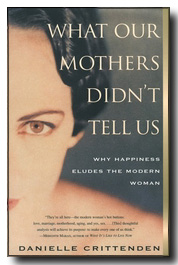Click, Clack
- SARAH E. HINLICKY
In her book "What Our Mothers Didnt Tell Us: Why Happiness Eludes the Modern Woman", Danielle Crittenden documents how feminism has imposed a rigid new set of feminist prejudices.

Not everyone is as lucky as I am, which is why we have Crittenden. She takes a long hard look at the results of women's lib and is gravely disappointed herself. Once upon a time, freethinking women tuned in to the subtle injustices of society through click experiences: A husband dropped his socks on the floor one too many times, and it would finally dawn on his wife that the personal is political. Crittenden's book, on the other hand, is a tally of what she calls clack experiences the opposite of clicks that expose how feminism has betrayed its commitment to real choices for women, imposing instead a rigid new set of feminist prejudices. The main triad of prejudices in favor of promiscuity, fierce independence, and work outside the home has not brought happiness to the daughters of feminists, Crittenden says, because it has closed off the alternatives.
We now have the freedom to say yes to casual sex, she observes, but almost never the freedom to save sex for commitment. We have the freedom to divorce our husbands on a whim, but not to protest when we ourselves are divorced on a whim. We're free to pursue our careers at the expense of everything else in our lives, but not to select a good man in our mid thirties when the uncontrollable laws of diminishing sexual attraction take over. We're free to put off pregnancy until it's convenient, but not to make our bodies fertile when it is. We're free to pursue independence at all costs, but not to become dependent on another. In effect, we are free to take on all the qualities that we despise most in men and abandon all the qualities that were once valued most in women. The journey has come full circle, Crittenden says; we're back to the busy, but spiritually empty lives that bored housewives protested 40 years ago. The only difference is the location.
Feminism has turned the world upside down in the past four decades, but women now find they don't completely like standing on their heads. Crittenden explains:
In Friedan's time, the problem was that too many people failed to see that while women were women, they were also human, and they were being denied the ability to express and fulfill their human potential outside the home. The modern problem with no name is, I believe, exactly the reverse of the old one. While we now recognize that women are human, we blind ourselves to the fact that we are also women.
This peculiar feminist misogyny rejects all of our distinctly female longings for romance, true love, and faithful husbands. We are told not to let kids interfere with our careers, but our bodies disagree, as women who delay childbearing discover with alarming force as their biological clocks approach midnight. And the so-called compassion disease, the feminine inclination to help and nurture and tend, is not a disease but a civilizing force on humanity. Now that we've been deprived of all these womanly things, Crittenden detects a disturbing tendency to rely on paternal politics liberal patriarchs in the Congress and statehouse rather than loving husbands.
What is to be done? Women have made countless demands on men in the past years, and now it's time for us to take equal responsibility for our actions. Until women relinquish the selfish right to independence at all costs, the situation won't improve. Crittenden recognizes that her ideas are tantamount to heresy for modern women, but she's on to something deeper than theory and politics. She suggests a revival of the traditional idea of getting married and having babies when our grandmothers would have, in their early twenties, and pursuing our careers later, when our children are in school. Women can have it all, Crittenden advises us, just not all at once.
There is much to recommend in her vision of society made over with the best interests of women and children in mind. But her prescriptions are easier to articulate than to carry out. Early marriage may be a practical solution it may, in fact, even be the right solution for the new problem with no name but: it is entirely contingent upon that elusive thing called love. Romance is infamous for showing up at the wrong time, or in the wrong person, or just not showing up at all. Lest one think that contemporary women are too picky about romance and should accept, as their grandmothers did, the first compatible bachelor to come along, one must be reminded that our grandmothers knew what to expect from those bachelors and the bachelors knew what society expected of them. That is no longer the case. The question begged by Danielle Crittenden's book is almost absurdly simple. How do we start?
Any takers?
_____________________________________________________________
What Our Mothers Didn't Tell Us: Why Happiness Eludes the Modern Woman
by Danielle Crittenden
Simon & Schuster, 224 pp., $23
_____________________________________________________________
 This is Meaghen Gonzalez, Editor of CERC. I hope you appreciated this piece. We curate these articles especially for believers like you.
This is Meaghen Gonzalez, Editor of CERC. I hope you appreciated this piece. We curate these articles especially for believers like you.
Please show your appreciation by making a $3 donation. CERC is entirely reader supported.

Acknowledgement
Hinlicky, Sarah E. Click, Clack. National Review (February 8, 1999).
Reprinted with permission of the National Review. To subscribe to the National Review write P.O. Box 668, Mount Morris, Ill 61054-0668 or phone 815-734-1232.
The Author
Sarah F. Hinlicky, a writer living in New York City, is an Editorial Assistant at First Things and a regular contributor to Boundless Webzine.
Copyright © 1999 National Review



